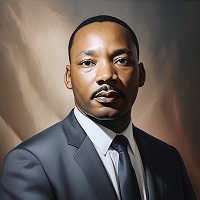

Quotes By Martin Luther King Jr.

Leader
Martin Luther King Jr.
Jan 15, 1929 - Apr 04, 1968
I saw with my own eyes over 3000 young Negro boys and girls, totally unarmed, leave Birmingham's 16th Street Baptist Church to march to a prayer meeting -- ready to pit nothing but the power of their bodies and souls against Bull Connor's police dogs, clubs and fire hoses. When they refused Connor's bellowed order to turn back, he whirled and shouted to his men to turn on the hoses. It was one of the most fantastic events of the Birmingham story that these Negroes, many of them on their knees, stared, unafraid and unmoving, at Connor's men with the hose nozzles in their hands.
There is such a thing as the freedom of exhaustion. Some people are so worn down by the yoke of oppression that they give up.
A few years ago in the slum areas of Atlanta, a Negro guitarist used to sing almost daily: "Been down so long that down don't bother me." This is the type of negative freedom and resignation that often engulfs the life of the oppressed.
To accept passively an unjust system is to cooperate with that system; thereby the oppressed become as evil as the oppressor. Non-cooperation with evil is as much a moral obligation as is cooperation with good.
There are many signs that the judgment of God is upon the church as never before. Unless the early sacrificial spirit is recaptured, I am very much afraid that today's Christian church will lose its authenticity, forfeit the loyalty of millions, and we will see the Christian church dismissed as a social club with no meaning or effectiveness for our time, as a form without substance, as salt without savor.
To accept injustice or segregation passively is to say to the oppressor that his actions are morally right. It is a way of allowing his conscience to fall asleep. At this moment the oppressed fails to be his brother's keeper. So acquiescence-while often the easier way-is not the moral way. It is the way of the coward.
A second way that oppressed people sometimes deal with oppression is to resort to physical violence and corroding hatred. Violence often brings about momentary results.
The real tragedy, though, is not Martin Luther King's disillusionment with the church -- for I am sustained by its spiritual blessings as a minister of the gospel with a lifelong commitment: The tragedy is that in my travels, I meet young people of all races whose disenchantment with the church has soured into outright disgust.
The principle of nonviolent resistance seeks to reconcile the truths of two opposites, acquiescence and violence, while avoiding the extremes and immoralities of both.
The nonviolent resister agrees with the person who acquiesces that one should not be physically aggressive toward his opponent; but he balances the equation by agreeing with the person of violence that evil must be resisted. He avoids the nonresistance of the former and the violent resistance of the latter.
Jesus is eternally right. History is replete with the bleached bones of nations that refused to listen to him.
For more that three centuries American Negroes have been frustrated by day and bewilderment by night by unbearable injustice, and burdened with the ugly weight of discrimination. Forced to live with these shameful conditions, we are tempted to become bitter and retaliate with a corresponding hate. But if this happens, the new order we seek will be little more than a duplicate of the old order.
Oppressed people deal with their oppression in three characteristic ways. One way is acquiescence: the oppressed resign themselves to their doom. They tacitly adjust themselves to oppression and thereby become conditioned to it. In every movement toward freedom some of the oppressed prefer to remain oppressed.
Returning hate for hate multiplies hate, adding deeper darkness to a night already devoid of stars.
The chain reaction of evil-Hate begetting hate, wars producing more wars-must be broken, or we shall be plunged into the dark abyss of annihilation.
We must recognize that the evil deed of the enemy-neighbor, the thing that hurts, never quite expresses all that he is. An element of goodness may be found even in our worst enemy.
We love our enemies by realizing that they are not totally bad and that they are not beyond the reach of God's redemptive love.
Every word and deed must contribute to an understanding with the enemy and release those vast reservoirs of goodwill which have been blocked by impenetrable walls of hate.
At times we are able to humiliate our worst enemy. Inevitably, his weak moments come and we are able to thrust in his side the spear of defeat. But this we must not do.
Only by following this way and responding with this type of love are we able to be children of our father which is in heaven.
Popular Authors









